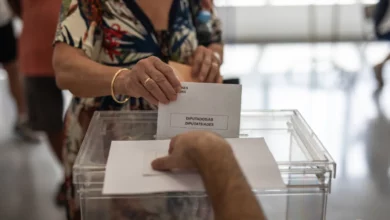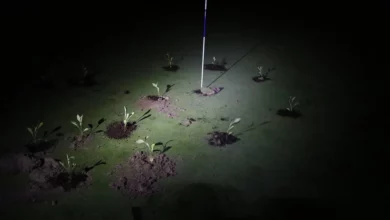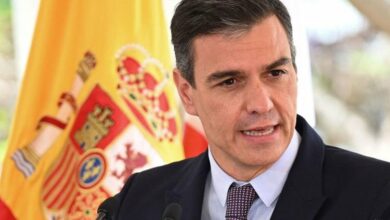
A bitter standoff dragging in everyone from politicians to footballers hits a climax Sunday when nationalists in Catalonia hope voters will back them to strike out for independence from Spain.
Insults and threats have been flying between Barcelona and Madrid this week ahead of the regional election that Catalan nationalists have framed as a vote on whether to break away and create a new state in Europe.
Catalonia's nationalist president Artur Mas, tipped by opinion polls to win the vote, called on Catalans to "Give the finger" to their opponents.
His adversaries have branded him a dodgy liar.
Writers, bankers and people on the street have joined in the angry debate.
"It is an unusually tense atmosphere," said Pablo Simon, a political scientist at Carlos III university in Madrid.
US President Barack Obama and British premier David Cameron, among others, have called for Spain to stay united.
"The economic powers are afraid of instability and encouraging voting based on fear. International leaders are commenting on the situation," Simon said.
"That happens in a referendum but never in a normal election."
– From footballers to intellectuals –
Normally Sunday's ballot would be just about electing members of the regional parliament. But since the Spanish government blocked his bid to hold a referendum, Mas has cast it as an indirect plebiscite on secession.
Spanish officials have threatened Catalans will be stripped of their nationality and warned they will plunge into financial chaos like Greece if they break away.
Mas said they will leave Spain to pay off the region's debt if Madrid doesn't sit down to talk, imperilling the country's economic recovery after years of recession.
Sporting officials have warned that Barcelona football club would drop out of the Spanish league. That has not stopped Barca players such as Gerard Pique backing independence, earning boos on the pitch from Spain fans.
Prominent intellectuals have written and jawed for and against secession as the Catalan issue has filled the press and airwaves for months.
The Peruvian-Spanish Nobel Prize-winning writer Mario Vargas Llosa said an independent Catalonia would be a "little country marginalised and governed by fanatical mediocrities".
Spain's conservative Prime Minister Mariano Rajoy has branded Mas's independence plan illegal. For three years he has refused to negotiate over demands for greater Catalan autonomy.
This week Rajoy was out in Catalonia, campaigning against Mas. At one point he drew boos from a street crowd yelling "Independence!"
At a rally later on, he called for "a massive vote in favour of common sense and responsibility to get out of this stage of uncertainty in Catalonia".
Rajoy says secession would put at risk pensions and bank deposits. He controversially suggested Catalans could be stripped of their Spanish nationality if the region seceded.
– 'Weapons of destruction' –
As tension has risen in the days leading up to the vote, banking and business associations as well as Spain's central bank have weighed in, warning an independent Catalonia would drop out of the eurozone.
"The stakes are high for Spain," said economist Jonathan Loynes at research group Capital Economics in London.
"Independence could clearly damage the economy" and worsen its debt ratio, he warned.
The latest opinion polls show Mas and his allies could win a majority in the Catalan parliament and nearly half the votes overall.
What would happen then is uncertain.
Depending on who wins the Spanish general election in December, Mas could soon have a new leader to talk to in Madrid.
Speaking to AFP in an interview, Mas said a win for his list would be tantamount to a "Yes" in a referendum.
He accused his opponents of waging a "campaign of intimidation".
"The weapons of destruction they are using in Madrid will not triumph in Catalonia," he told supporters on Wednesday.
If pro-separatist candidates win, Catalonia would work to declare independence in 18 months or two years, he said.
"I think that is highly unlikely," said the political analyst Pablo Simon.
"But what is very likely is that we will face a situation of tension and great division. Negotiation will be very complicated and very hard."




